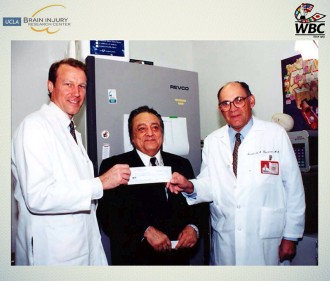
|
Philippines, 22 Jan 2026 |
Home >> News |
 |
||||
|
|
|
|
WHILE BOXING WELCOMES COLLABORATION BETWEEN THE WBC AND THE UCLA BRAN RESEARCH CENTER, HOW COME NOTHING IS BEING DONE ABOUT USE OF PERFORMANCE ENHANCING DRUGS? By Ronnie Nathanielsz PhilBoxing.com Sun, 27 Dec 2015  As a boxing commentator for over 50 years we welcome the collaboration between the World Boxing Council and the UCLA Brain Injury Research Center but wonder why nothing is being done about the use of performance enhancing drugs. The WBC reports that for the last 35 years, the WBC under Don Jose Sulaiman and his son and successor Mauricio Sulaiman have worked with the BIRC to use science to learn how to best protect athletes in boxing under the WBC SPAR program founded under the leadership of Dr. Gerald Finnerman and Dr. David Hoyda and such research led to findings which produced changes in rules and protocols which included ?reducing the number of rounds from 15 to 12, to securing the thumbs on boxing gloves, to moving the official weigh-in to a day before a fight to allow athletes more time to rehydrate prior to a bout and many more.? The WBC says ?Practical steps have been taken to improve athlete safety. ?Sports rules and policy should be based on science rather than prejudicial ideas or unfounded beliefs,? says Dr. David Hovda, Founder and Director of the UCLA BIRC, who has advised both professional sports organizations and the U.S. military with regards to brain injury. Now the WBC looks to continue this legacy. ?We must continue to research areas which can find ways to protect, diagnose and treat sports-related traumatic brain injury?our relationship with UCLA goes back many years and together have saved countless lives in boxing, other sports. armed forces activity and in all areas of common life? says World Boxing Council president Mauricio Sulaim?n. "On the event of the opening of the movie Concussion?, another light will shine on player's welfare. It is our hope that this heightens public awareness as we continue to make our athletes well-being a priority." reiterates, Jill Diamond, WBC Cares chair. Sports-related traumatic brain injury (TBI) and concussion are increasingly in the public eye, with sports concussions a hot topic in recent news reports, research studies and even television and movies. While combat sports have a naturally higher risk for concussion, working collaboratively will allow for better health and safety of the athletes through improved medical care, advanced research and potentially changes in policy that are driven by data. Says Dr. Chris Giza, Professor and Neurologist in the UCLA BIRC, ?Contact sports are happening all over the world...working together with willing stakeholders is the fastest way to better understand the risks and to make sports participation as safe as possible.? UCLA and the WBC will announce specific actions during the first quarter of 2016 with a very interesting working plan. However, the failure to tackle the use of PEDs or Performance Enhancing Drugs raises our own concern, along with other sectors of the sport. We have been witness to fighters getting badly beaten in the first half of a fight and then suddenly finding some hidden power in terms of stamina that allows them to throw ,constant flurries of punches with absolutely no signs of fatigue which fuels suspicions of drug abuse. Perhaps the WBC and UCLA can answer our concerns. Click here to view a list of other articles written by Ronnie Nathanielsz. |
|
|
PhilBoxing.com has been created to support every aspiring Filipino boxer and the Philippine boxing scene in general. Please send comments to feedback@philboxing.com |
PRIVATE POLICY | LEGAL DISCLAIMER
developed and maintained by dong secuya © 2026 philboxing.com. |